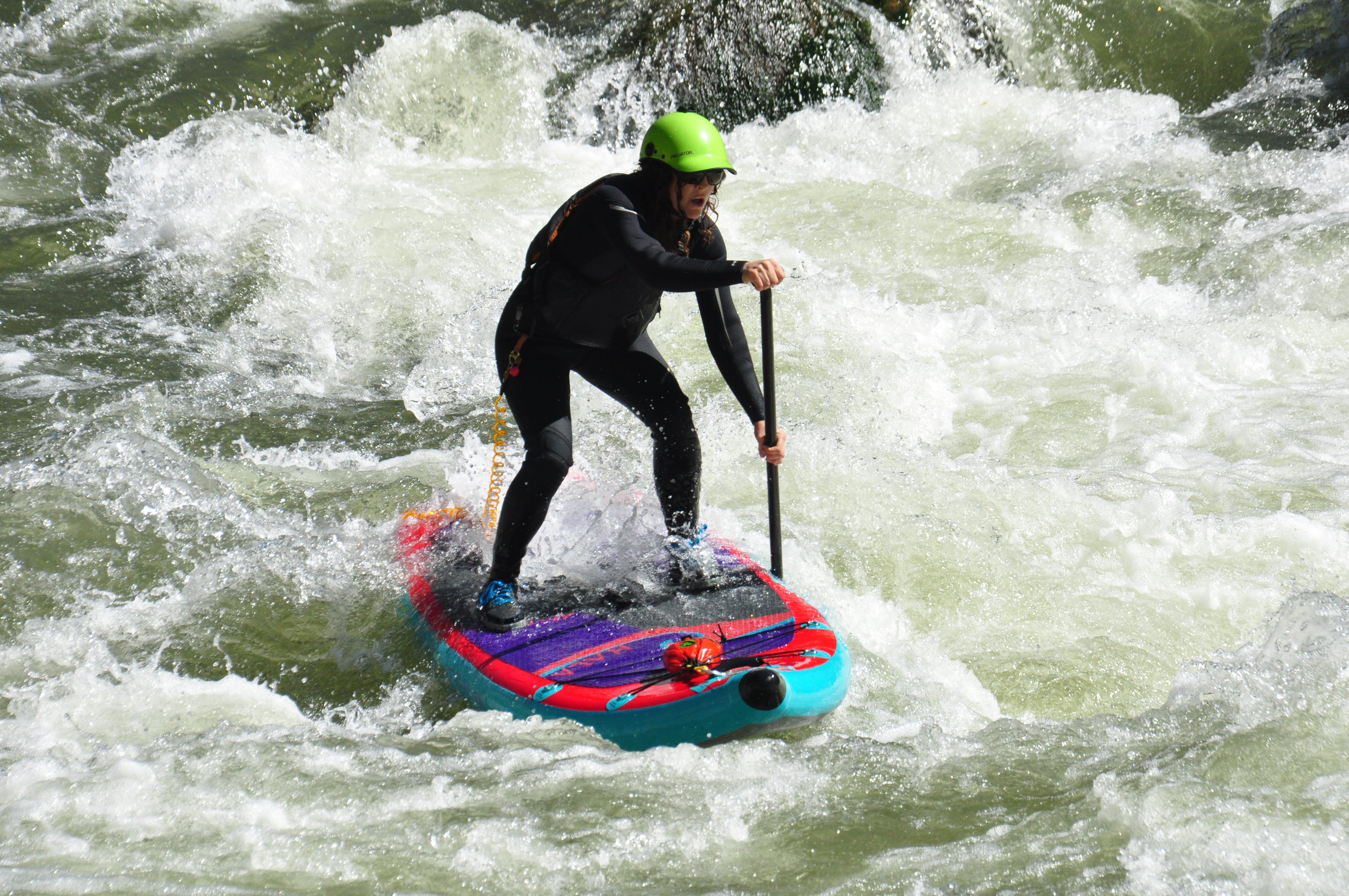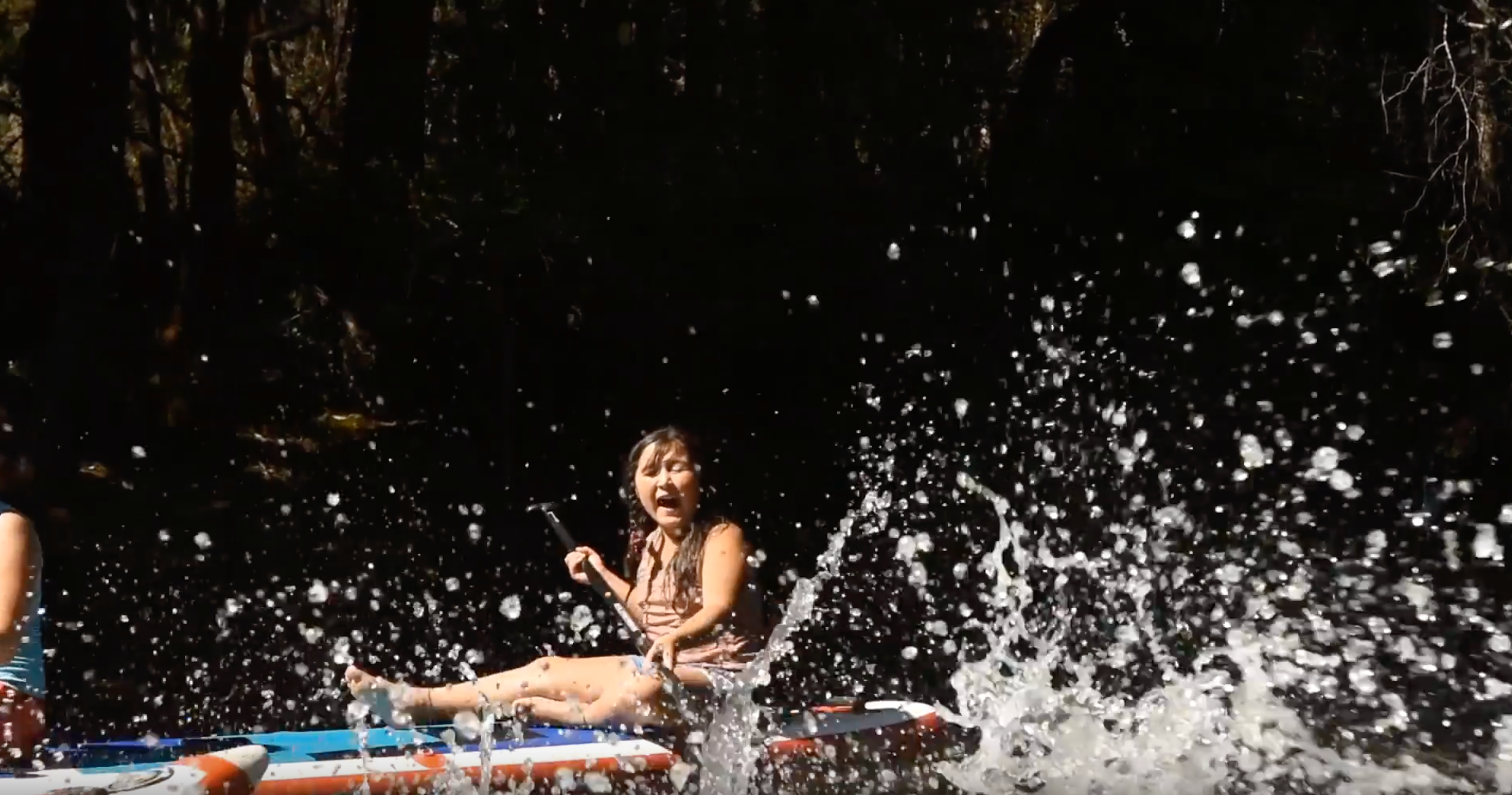
Why I Love Losing
Five years ago I was brand-new to whitewater SUP, and SUP was new to Colorado. Like many others, I tried it once and knew I’d be hooked for life. It was difficult to find people who wanted to travel downstream on a river on (or swimming near) a little inflatable board through whitewater. I started racing to meet others who had fallen in love with river SUP.
Knowing nothing about racing, or whitewater, or SUP, I decided to face my life-long fear of competitive athletic women. I played no sports in high school, so I was more than a little out of my element.
 My first race was the FIBArk downriver sprint. I worked up the courage to ask a few of my fellow competitors for some tips, as it was my first race and I had also never seen this section of the river. They piled it on, but the only thing I really remembered was the godmother of river SUP, Jenny MacArthur, telling me: “Keep your knees loose!” It’s stuck with me to this day.
My first race was the FIBArk downriver sprint. I worked up the courage to ask a few of my fellow competitors for some tips, as it was my first race and I had also never seen this section of the river. They piled it on, but the only thing I really remembered was the godmother of river SUP, Jenny MacArthur, telling me: “Keep your knees loose!” It’s stuck with me to this day.
For cold water protection I wore a bikini. The race was a blur. There was a mass start, with men and women chopping at the water in a frenzy, thrashing through a standing wave together, jockeying for position. My paddle, my board, and my body all went through the wave at different times.
The water was shallow and freezing. Both of these qualities I thoroughly investigated as I dug my (borrowed) paddle into the undulating wave trains and pulled myself off of my (borrowed) board into the Arkansas River again and again and again. 
I finished dead last. The women who’d coached me at the top waited for me at the finish line, hugging me, heaping on praise for competing despite obviously having no SUP skills whatsoever. I left with a pile of phone numbers of new river partners and an overwhelming sense of warmth. The support was overwhelming. I couldn’t wait to race again.
I lost a lot. Like, dead last almost every race. Someone once told me I had a great attitude about this, and I replied: “the big shots have to have someone to beat.” It’s true I was losing a lot, but I was racing against the biggest names in this tiny sport. The fact that amateurs can show up to races and stand shoulder-to-shoulder with the pioneers of the sport—legends like Jenny, Nikki Gregg, Brittany Parker, Charle MacArthur, Dan Gavere—is pretty cool, and it made me feel a lot better about getting my ass kicked every weekend in the spring.
Sometimes a dozen or so women showed up to the races in Colorado’s competitive circuit—Golden Games, Yampa River Festival, CKS Paddlefest, GoPro Games, Vail’s weeknight race series, FIBArk —but sometimes a lot fewer women showed up, too. Sometimes two or three of us women just had to race the men. No matter who showed up, I came in dead last every time that first year, and I always walked away grinning. My rivals coached me. I got a little better.
Eventually, getting beaten started to pay off. I got way better at paddleboarding, and I also got better at racing. (Want to know my racing secret? Don’t race hungover.) A few times the big shots didn’t show up for various reasons—injuries, personal conflicts, other races—and I started sneaking my way up towards the podium. More women joined the sport, and as the playing field grew, I found myself more experienced than other racers.
I even made it to the top of the podium at FIBArk a few years later! It was pretty hard to believe. How did I win? I’d love to say it was countless training laps down the racecourse. But the truth is, there was almost no one to beat.
There were men in the water, but hardly any women. A few beginner women raced, and they were pretty easy to beat simply because I had experience. All I had to do was finish the 10-mile course in one piece, and I did.
 Now it’s 2017. I haven’t made it to the podium yet this season, and I couldn’t be happier about it.
Now it’s 2017. I haven’t made it to the podium yet this season, and I couldn’t be happier about it.
Because now there are definitely women to beat, and it takes a lot of work to stay in front of them. And now there are definitely women who are beating me, and I have to work hard to keep them in my sight.
Last month I raced in the FIBArk downriver sprint once again. I had a great start, and began the 10-mile slog in a pack that included former Olympic kayaker Rebecca Giddens, and my Hala teammate, Cami Swan, who cross-trains for this sport by doing acrobatics on (moving) horses.
Cami fell, and I screamed unintelligible encouragement at her to get back on her board. I fell, and she did the same for me. It helped. Natali Zollinger caught up on a lightning-fast carbon board, and the pace quickened. We kept our eyes trained on Rebecca, her steady and measured paddle strokes flowing seamlessly out of her powerful body, pulling further away from us. It was mesmerizing to watch. I hardly felt my own paddle dip into the water as I watched these outrageously strong women raise the bar right before my eyes.

You see, I love these women for kicking my ass. I love them because they make me better. The days of showing up to a race with a hangover and simply finishing intact for a podium position are gone.
So I’m losing again. Not because I’m an underdressed beginner anymore, but because the women around me have seriously stepped up the game.
I love losing. These women make me work so much harder. They force me to get stronger. They force me onto the river when I’d rather sit around or do chores. When I consider having a lazy day, I consider Rebecca’s shoulders. If I paddle today, and paddle tomorrow, and then do it the next day, then maybe, just maybe I’ll look down from that top position on the podium someday.
Until then, I am humbled to race against—and lose to—these fierce female athletes I call my friends.
Ashley Bean is a team rider for Hala Gear.



Leave a comment
This site is protected by hCaptcha and the hCaptcha Privacy Policy and Terms of Service apply.